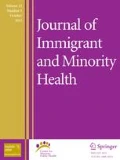Abstract
Background Californian Latinos have lower rates of colorectal cancer (CRC) screening compared to non-Latino whites, which may account in part for disparities in colorectal incidence trends. Methods Participants, 603 Mexican-American men and 893 women aged 50 and older who had not been diagnosed with colon cancer, reported CRC screening behavior on the 2005 California Health Interview Survey. A 7-item acculturation index (English language use/proficiency, nativity, citizenship, and years living in the U.S.) was developed. A logistic regression model predicted CRC screening as a function of acculturation. Results Higher acculturated Mexican-Americans were 3–4 times more likely to have had both fecal occult blood test and endoscopic CRC screening. Lower acculturated Mexican men and women were twice as likely to not have any CRC screening. Discussion Colorectal screening is effective in preventing cancer; educational and outreach efforts and efforts to decrease language barriers among lower-acculturated Mexican-Americans should be intensified.
Similar content being viewed by others
References
U.S. Census Bureau. (n.d.). Retrieved January 10, 2008 from http://www.census.gov/.
Improving the Use of Cervical and Colorectal Cancer Screening. U.S. Department of Health and Human Services. Centers for Disease Control and Prevention. The Guide to Community Preventive Services; 2005. Retrieved January 10, 2008 from http://www.thecommunityguide.org/cancer/screening/ca-screening.pdf.
American Cancer Society. Cancer Facts & Figures for Hispanics/Latinos 2006–2008. Atlanta, GA; 2008. Retrieved November 17, 2008 from http://www.cancer.org/docroot/STT/stt_0.asp.
Behavioral Risk Factor Surveillance System. (n.d.). Retrieved January 10, 2008 from http://www.cdc.gov/brfss/index.htm.
Healthy People 2010. U.S. Department of Health and Human Services. Retrieved January 10, 2008 from http://www.healthypeople.gov/.
Smith RA, Cokkinides V, Eyre HJ. Cancer screening in the United States, 2007: a review of current guidelines, practices, and prospects. CA Cancer J Clin. 2007;57:90–104.
Mitka M. Colorectal cancer screening rates still fall far short of recommended levels. JAMA. 2008;299:622.
Frasier LA, Colditz GA, Fuchs CS, Kuntz KM. Cost-effectiveness of screening for colorectal cancer in the general population. JAMA. 2000;284:1954–61.
Ransohoff DF, Lang CA. Screening for colorectal cancer with the fecal occult blood test: a background paper. Ann Intern Med. 1997;126:811–22.
Lara M, Gamboa C, Kahramanian MI, Morales LS, Hayes Bautista DE. Acculturation and Latino Health in the United States: a review of the literature and its sociopolitical context. Annu Rev Public Health. 2005;26:367–97.
Hiatt RA, Klabunde C, Breen N, Swan J, Ballard-Barbash R. Cancer screening practices from National Health Interview Surveys: past, present, and future. J. Natl Cancer Inst. 2002;94:1837–46.
Etzioni DA, Ponce NA, Babey SH, Spencer BA, Brown ER, Ko CY, et al. A population-based study of colorectal cancer test use: results from the 2001 California Health Interview Survey. Cancer. 2004;101:2523–32.
Liang SY, Phillips KA, Nagamine M, Ladabaum U, Haas JS. Rates and predictors of colorectal cancer screening. Prev Chronic Dis. 2006, October. Retrieved January 14, 2008 from http://www.cdc.gov/pcd/issues/2006/oct/06_0010.htm.
Pollack LA, Blackman DK, Wilson KM, Seeff LC, Nadel MR. Colorectal cancer test use among Hispanic and non-Hispanic U.S. populations. Prev Chronic Dis. 2006; April. Retrieved January 14, 2008 from http://www.cdc.gov/pcd/issues/2006/apr/05_0120.htm.
Seeff LC, Nadel MR, Klabunde CN, Thompson T, Shapiro JA, Vernon SW, et al. Patterns and predictors of colorectal cancer test use in the adult U.S. population. Cancer. 2004;100:2093–103.
Shah M, Kangmin Z, Potter J. Hispanic acculturation and utilization of colorectal cancer screening in the United States. Cancer Detect Prev. 2006;30:306–12.
Maciosek MV, Coffield AB, Edwards NM, Goodman MJ, Flottemesch TJ, Solberg LI. Priorities among effective clinical preventive services: results of a systematic review and analysis. Am J Prev Med. 2006;31:52–61.
Pignone M, Rich M, Teutsch SM, Berg AO, Lohr KN. Screening for colorectal cancer in adults at average risk: a summary of the evidence for the U.S. Preventive Services Task Force. Ann Intern Med. 2002;137:132–41.
Maciosek MV, Solberg LI, Coffield AB, Edwards NM, Goodman MJ. Colorectal cancer screening: health impact and cost effectiveness. Am J Prev Med. 2006;31:80–9.
Mandelblatt JS, Yabroff KR, Kerner JF. Equitable access to cancer services: a review of barriers to quality care. Cancer. 1999;86:2378–90.
Pérez-Stable EJ. Language access and Latino health care disparities. Med Care. 2007;45:1009–10.
Pippins JR, Alegría M, Haas JS. Association between language proficiency and the quality of primary care among a national sample of insured Latinos. Med Care. 2007;45:1020–5.
Stone EG, Morton SC, Hulscher ME, Maglione MA, Roth EA, Grimshaw JM, et al. Interventions that increase use of adult immunization and cancer screening services: a meta-analysis. Ann Intern Med. 2002;136:641–51.
Solis JM, Marks G, Garcia M, Shelton D. Acculturation, access to care, and use of preventive services by Hispanics: findings from HHANES 1982–84. Am J Public Health. 1990;80 Suppl:11–9.
Universal Symbols in Health Care Workbook: Executive Summary; Best Practices for Sign Systems. Robert Wood Johnson Foundation. Retrieved January 10, 2008 from http://www.segd.org/resources/symbols.html.
Gorin SS, Heck JE. Cancer screening among Latino subgroups in the United States. Prev Med. 2005;40:515–26.
Shapiro JA, Seeff LC, Nadel MR. Colorectal cancer-screening tests and associated health behaviors. Am J Prev Med. 2001;21:132–7.
Marín G, Sabogal F, Marín BV, Otero-Sabogal R, Pérez-Stable EJ. Development of a short acculturation scale for Hispanics. Hisp J Behav Sci. 1987;9:183–205.
Ver Ploeg M, Perrin E, editors. Eliminating health disparities measurement and data needs. 2004 panel on DHHS Collection of Race and Ethnicity Data Committee on National Statistics Division of Behavioral and Social Sciences and Education. National Research Council of the National Academies. Washington, DC: The National Academies Press; 2004.
Hunt LM, Schneider S, Comer B. Should acculturation be a variable in health research? A critical review of research on US Hispanics. Soc Sci Med. 2004;59:973–86.
Berry JW. Immigration, acculturation, and adaptation. Appl Psychol: Int Rev. 1997;46:5–68.
Acknowledgements
This work was supported by a New Connections grant (http://www.rwjf-newconnections.org/) from the Robert Wood Johnson Foundation (#58142). The author wishes to acknowledge Debra Joy Pérez, Program Officer, for her contributions and mentorship on this project.
Author information
Authors and Affiliations
Corresponding author
Rights and permissions
About this article
Cite this article
Johnson-Kozlow, M. Colorectal Cancer Screening of Californian Adults of Mexican Origin as a Function of Acculturation. J Immigrant Minority Health 12, 454–461 (2010). https://doi.org/10.1007/s10903-009-9236-9
Received:
Accepted:
Published:
Issue Date:
DOI: https://doi.org/10.1007/s10903-009-9236-9



